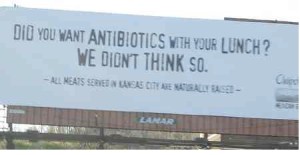Yes, I said it.
 Sure it was 4 a.m., I was talking with Joseph Erbentraut of The Huffington Post, getting ready for hockey, and didn’t want to deal with niceties.
Sure it was 4 a.m., I was talking with Joseph Erbentraut of The Huffington Post, getting ready for hockey, and didn’t want to deal with niceties.
It’s been six months since the start of Chipotle’s food safety crisis — a series of six outbreaks that have sickened at least 500 people.
The company has apologized for the outbreaks of norovirus and E. coli, tweaked its cooking methods and announced that it will temporarily close all its stores for a companywide food safety meeting on Feb. 8. But with an investigation by the Centers for Disease Control and Prevention still underway, it appears the company still hasn’t identified the source of the contamination.
Chipotle spokesman Chris Arnold pointed The Huffington Post to a Jan. 19 press release announcing that the company’s “comprehensive new food safety programs” are largely already in place, and that it will be sharing information with its employees at the Feb. 8 meeting about what they believe caused the food safety issues.
Doug Powell, a former Kansas State University food safety professor and the publisher and editor of Barfblog, a popular food safety blog, isn’t convinced. He’s been wary of Chipotle for almost a decade now, and has his doubts that the company’s new approach will solve anything.
HuffPost recently spoke with Powell about why Chipotle has struggled in its response to the outbreaks — and what it should be doing instead.
This interview has been edited for length and clarity.
Why is it taking Chipotle so long to figure out the source of this E. coli outbreak, compared to the other food safety issues they’ve had over this last year?
 Never underestimate the power of denial. The epidemiology is clear that there was an outbreak involving E. coli O26, and in this case it was probably from the cilantro or some other fresh produce item that wasn’t cooked. Fresh produce is the biggest source of foodborne illness in the U.S. and has been for the last 10 years, and that’s because it’s not cooked. We want it fresh.
Never underestimate the power of denial. The epidemiology is clear that there was an outbreak involving E. coli O26, and in this case it was probably from the cilantro or some other fresh produce item that wasn’t cooked. Fresh produce is the biggest source of foodborne illness in the U.S. and has been for the last 10 years, and that’s because it’s not cooked. We want it fresh.
Somehow in the last five years in the U.S., the produce folks have gotten much more aggressive about having to test [bacteria] in the product and find it. Tell any scientist that and they’ll say that’s bullshit, because it’s a fresh product, so it’s here and gone and we’re not going to find [bacteria]. Testing really only tells you that this one really minor sample, in this one batch, in one lot, came back negative. It doesn’t tell you much else. You can’t test your way to a safe food supply.
Chipotle has really built its brand around using fresh produce, and consumer demand for food like this has been rising. So the company has put itself in this risky position, right?
It doesn’t have to increase the risk. It means that they have to be better at having on-farm food safety plans for their suppliers and enforcing them. It seems to me that Chipotle was much more concerned about being natural, sustainable, GMO-free, hormone-free — anything but microbiologically safe — and that’s why they’ve had six outbreaks in six months. The two norovirus outbreaks have nothing to do with the on-farm contamination. That’s human.
They say they’ve introduced sick leave [on Wednesday], but they actually had it six months ago. They’re recycling press releases at this point, which tells me they’re kind of desperate. They’re all about the money and they’ve lost 47 percent of their stock value.
The company is facing a new class-action lawsuit this week, where it’s being accused of a cover-up in the norovirus outbreak in Simi Valley, California. How much damage has this done to Chipotle’s brand at this point?
It’s billions of dollars. It’s embarrassing that a company is allowed to get away with this sort of stuff, these multiple failures, while at the same time they’re charging a premium for “sustainable” food, whatever that means. All these adjectives that they use in their marketing don’t really mean anything. This is a company really focused on bullshit rather than being focused on microbiologically safe food. [Chipotle has emphasized that it is just as dedicated to using what it calls the highest-quality ingredients as it is to being an industry leader in food safety.]
Does the question of government regulation play a role in this?
Government is there to ensure a minimum standard. But they do not make the profit and they do not really enforce safe food. That is up to the company… You want to make the profit off the food, you’re going to be liable. So they’re taking some well-deserved hits at this point. Whether they’ll recover or not — they can, but just going to the PR solution and this gimmick of shutting all the stores down for two hours on Feb. 8 isn’t how you do training. It takes every week reinforcing the messages and focusing on one goal.
What should Chipotle be doing right now that it isn’t already? Are there examples to look to of similar companies that have handled this effectively?
They’ve followed the Jack in the Box model from 1993 in that they hired some food safety consultants and they’re listening to them. That’s good, but that is not going to change the culture within the organization. Those two norovirus outbreaks are cultural things more than anything. That’s not some mysterious bug coming in — it’s employees showing up sick to work. They can say they have strict procedures that sick employees don’t work, but anyone who’s ever worked at a restaurant knows what happens when you don’t show up to work. You’re done.
I don’t see, so far, that they’ve gotten that religious about food safety. They’ve hired some good consultants and they’ll do more testing and that’s all good, but when you’ve got 2,000 locations, that’s a pretty big vulnerability.
And get off my bench, posers.
